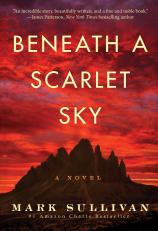Reading Group Guide
Discussion Questions
Beneath a Scarlet Sky

1. BENEATH A SCARLET SKY is a work of historical fiction. As you were reading did you feel that the story was authentic? Given that the truth about what actually happened to each character is included at the end, talk about how Mark Sullivan crafted an interesting story while also sticking to the facts.
2. Throughout the book, Sullivan describes horrific scenes filled with violence, bombings and ruthless executions. How well do you think he captures the fear in the air? Does he strike the right balance between page-turner and paying homage to the brutal truth?
3. At the beginning of BENEATH A SCARLET SKY, bombs are dropped on Milan, destroying sections of the city. At this point, Mr. Beltramini’s grocery is saved. In talking to Pino Lella, Beltramini says, “If a bomb’s coming at you, it’s coming at you. You can’t just go around worrying about it. Just go on doing what you love, and go on enjoying your life.” What are your thoughts about his advice? Given what’s going on in the world today, do you live in fear of terrorism or war? How do you balance “enjoying your life” in spite of your fear?
4. If you or members of your book discussion group lived through World War II, here or abroad, how do your recollections match the emotions that you are reading here?
5. Father Re enlists Pino’s help to usher Italian Jews through the mountains to Switzerland and to safety. Catholics and Jews clearly have different belief systems. In today’s world, what do you think it would take for a Christian to help, say, a Muslim in a similar manner in a place of war? Do you think it’s possible for such an underground network to exist today?
6. Mrs. Napolitano is a pregnant Italian Jew who successfully escapes over the mountain pass in the dead of winter, in one of the most dramatic passages in the book. She almost dies along the way. If you were in her shoes, do you think you’d be brave enough to attempt the trek? What does it mean to be brave in the face of death?
7. There is a moment when Colonel Rauff, the head of the Gestapo in Milan, helps Father Re’s boys corral oxen into a pen. He enjoys himself and almost seems…human. What do you think the author intended by choosing to portray such an evil man in this light? Was it effective?
8. Just a few months shy of Pino’s 18th birthday, his father calls him back to Milan and demands that he enlist instead of waiting to be drafted. The catch? Enlisting with the Germans is safer. He is given a choice and chooses to enlist. Knowing you’d have to work for the enemy, what would you have done if you were in Pino’s shoes?
9. Almost by chance, Pino becomes the driver for one of the highest-ranking German officers in Italy. It’s a chance for Pino to become a spy, once again risking his life. If you were Pino, would you take advantage of the opportunity, knowing it could put your family in significant danger?
10. Pino’s best friend from childhood finds out that he’s a Nazi and accuses him of being a traitor. Pino can’t, of course, tell him the truth because it would put the mission in danger. What would it take for you to make a similar sacrifice? Is there a cause for a “greater good” that you’d risk anything for?
11. Anna catches Pino in the act of rifling through the Major General Hans Leyers’ things. When he tells her the truth, she softens and they kiss. What was your initial reaction during that scene? Did you trust Anna? Why or why not? How did your gut feeling change as the novel progressed? Do you think she deserved her fate?
12. After Pino and Major General Leyers are nearly killed by a British fighter plane, Leyers opens up to Pino and shares a bit about his life. Did this scene change the way you thought about him? Are people 100% evil, or is it possible to find humanity or goodness in everyone?
13. Major General Leyers gives Pino advice: “Doing favors… they help wondrously over the course of a lifetime. When you have done men favors, when you look out for others so they can prosper, they owe you. With each favor, you become stronger, more supported. It is a law of nature.” How does this statement inform Leyers’ character? Do you agree with this statement? Is doing and receiving favors about “owing,” or is it about something else?
14. Major General Leyers saves four sick children from Platform 21…and from death. Why do you think he does this? Out of the goodness of his heart, or is it one of his favors?
15. When the Germans surrender, the Italians turn on each other and many butcher each other to death, either for doing nothing or for being friendly with the Germans. Are their actions justified? Or is this violence just as condemnable?
16. Toward the end, Pino is given the chance to execute Major General Leyers. He doesn’t take it. Why do you think that is? What would you have done?
17. The ending is quite a shocker. Did you see it coming? Why or why not?
18. In certain sections, particularly in conversations between characters, Sullivan writes in a modern style. What effect, if any, does this have on the story or your perception of events? Does he capture the mood of the 1940s?
19. Sullivan provides information about what actually happened to the characters in the novel. After completing the book and finding out their destinies, did you feel each character got what they deserved?
20. In the preface, author Mark Sullivan admits to being suicidal the night he came up with the idea for BENEATH A SCARLET SKY. Did that information have any impact on how you perceived the book?
Beneath a Scarlet Sky
- Publication Date: May 1, 2017
- Genres: Fiction, Historical Fiction
- Paperback: 524 pages
- Publisher: Lake Union Publishing
- ISBN-10: 1503943372
- ISBN-13: 9781503943377








